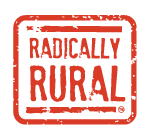If you read our newsletter leading up to this trip, you know that the reason Hood River has been on our radar since 2021 is because our very first Radically Rural Roundtable featured Matt Swihart, founder and owner of Double Mountain Brewery, a local brewery in Hood River that had made the bold decision to use returnable, refillable bottles to sell their beer. They eventually became the flagship business to pilot the first statewide program. Van Havig of Gigantic Brewing in Portland was also on the Roundtable as an early adopter after the program went state-wide.

Our grandparents might laugh at this concept being seen as innovative, given that it was the only option up until the 1930s when disposable steel cans were introduced, after which refillable glass continued to decline in popularity and use.
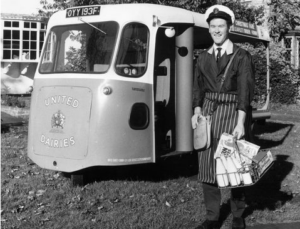
However, in today’s world, it truly is bold and innovative to reinvent these systems. Refillable bottles reduce the carbon footprint by 90% every time they are used. It replaces the equivalent of about 67 cans. Cans are also made with Bauxite, which has to be mined and therefore deforests large swaths of the earth in the process. It then has a plastic liner installed on the inside of the can to prevent corrosion as a reaction to the beer. Recycling cans comes with its own challenges, including the fact that shrink wrap or pressure sensitive labels cannot be recycled, which are what most small local breweries use.
When we flew into Portland, we made sure to visit Gigantic before heading to Hood River. When looking up directions on the website, the first banner to pop up was, “Gigantic is now in Cans!” The irony of our traveling there for refillable bottling in local breweries was not lost on me. When we went to Gigantic, we asked a lot of questions about why they had made the decision to revert to cans. They did keep some of their options in bottles, but the majority were back to cans. They said that they had continued to lose out on deals with retailers and that the bottles weren’t financially viable. Matt at Double Mountain Brewery has been clear that using refillable bottles is cheaper than cans (because they can be used 25-30 times), but that doesn’t mean that you won’t lose out on sales deals with the landscape as it currently is.
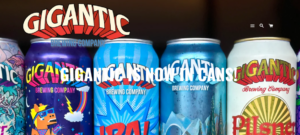
When we met up with Matt, one of the first questions I asked him was about Gigantic’s decision to go back to cans. He spoke very well of Van and was empathetic as a business owner about his decision, understanding that it was driven by economics. But then he said something that was quite representative of the changing ways we have to start thinking about what it means to thrive. He said, “I guess it all depends on what your goal is. Is your goal to take over the world and grow exponentially? Or is it to provide a good living for yourself and your employees and do good work in the world?” He said that he really only aims to grow about 5% each year to keep up with inflation and keep his employees’ income growing. Not having the pressure of intense growth trajectories or of trying to franchise his location gives room to focus on how the work is done.
My whole experience being there at the local brewery was beautifully rural. While in the restaurant, Matt greeted many folks by name. As we were chatting in the warehouse where the bottles were being refilled, someone hopped off an electric scooter with a box of refillable, returnable bottles and dropped them in the bin. He and Matt waved and smiled at each other– “That’s one of our local coffee shop owners,” Matt said.
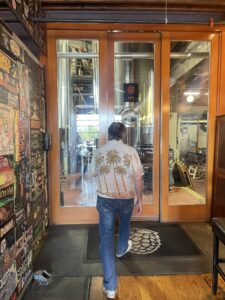 While we were sitting and chatting in the brewery, Matt and I bonded over the fact that both of us have lived in Rwanda (him for the Peace Corps, leaving only six months before the genocide, and me to teach English, nearly twenty years after the genocide) and both noticed how vital the returnable, refillable bottling practice was there. If a developing country can do it, why can’t we? In fact, in most countries this is standard. He recalled how precious the bottles were to the shop owners in Rwanda, even more than what was inside. Once when he and another Peace Corps buddy stationed in Burundi were going to take a motorcycle ride out to the countryside, they purchased some beer and went to throw the bottles in their backpacks. The store owner was appalled and told them that they couldn’t leave the store with the bottles. Matt ended up offering them a compromise, leaving his watch as collateral in proof that they would, in fact, return the bottles.
While we were sitting and chatting in the brewery, Matt and I bonded over the fact that both of us have lived in Rwanda (him for the Peace Corps, leaving only six months before the genocide, and me to teach English, nearly twenty years after the genocide) and both noticed how vital the returnable, refillable bottling practice was there. If a developing country can do it, why can’t we? In fact, in most countries this is standard. He recalled how precious the bottles were to the shop owners in Rwanda, even more than what was inside. Once when he and another Peace Corps buddy stationed in Burundi were going to take a motorcycle ride out to the countryside, they purchased some beer and went to throw the bottles in their backpacks. The store owner was appalled and told them that they couldn’t leave the store with the bottles. Matt ended up offering them a compromise, leaving his watch as collateral in proof that they would, in fact, return the bottles.
After leaving the Peace Corps, Matt worked at a home brewing supply store and developed his love of brewing. He ended up going to beer school (yes, it’s a thing) in Chicago, and moved to Hood River right after that to work in another local brewery. After 14 years with that brewery, he decided to start his own. Someone naturally conscious about the environment, he originally wanted to start the business using refillable, returnable bottles. He quickly discovered the challenges of doing that when the infrastructure was all but non-existent. Further, initially, they couldn’t keep up with production. It took six years before 2012 when he could get his head above water enough to keep investing in the infrastructure and manpower needed to get the job done. They had been in the rhythm of refillables for about six years when he was approached in 2018 by the Oregon Beverage Recycling Cooperative (OBRC), which wanted to create a system that could be used state-wide. Matt worked with them to design the bottles and help get the infrastructure set up.
Matt is also clear that the benefits of using refillable bottles are not only about the environmental impact. One is particularly important for rural communities, which is the stability and predictability of the supply chain. COVID was tough for breweries and there is a lot of competition now, but refillables insulated Double Mountain, because they never had a shortage of cans like everyone else. Using bottles also yields the highest quality and tastes the best. Because of the wide mouth of cans, it’s hard to get all the oxygen out when filling, which impacts the taste.
With all of these benefits, why aren’t more states doing this? Convenience is king. But just like other changes that are necessary to make, it will eventually be normalized. Matt believes that what we need is better hard infrastructure like wash facilities. We also need soft infrastructure like policy to ensure that retailers have to give shelf space to refillables.
Even though Oregon is the most progressive with this work, only about 5 businesses have adopted the refillable model. Oregon’s strong bottle bill is still a very impactful program for recycling (see stats below), and having a good bottle bill would be the first step for states who are considering doing this.
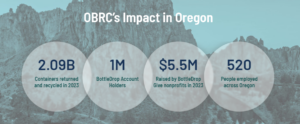 Are there other rural angles to this model? Well yes, I’d say. Returnable systems thrive when there are relationships present, which we know are second nature to rural folks. Furthermore, rural communities have always been places of great innovation and generative ideas.
Are there other rural angles to this model? Well yes, I’d say. Returnable systems thrive when there are relationships present, which we know are second nature to rural folks. Furthermore, rural communities have always been places of great innovation and generative ideas.
In the airport getting ready to leave Oregon, there was Gigantic beer in the gift shop, sitting on the shelf with the other canned options; Double Mountain was nowhere to be found. This leaves us with questions that we should all consider. What are the signs of success of a business? How are those measured and how does that drive our decision making? What actions can we take in our world to ensure that businesses using practices like refillables are on the same playing field as other businesses who aren’t?
Written by RR Director, Julianna Dodson.
